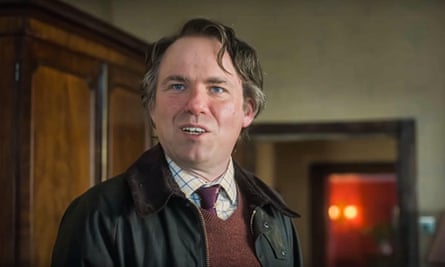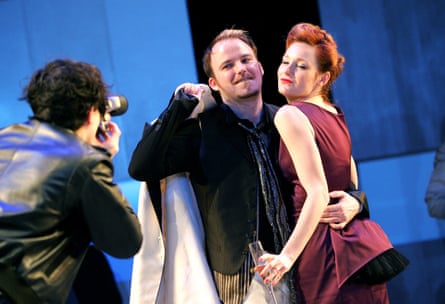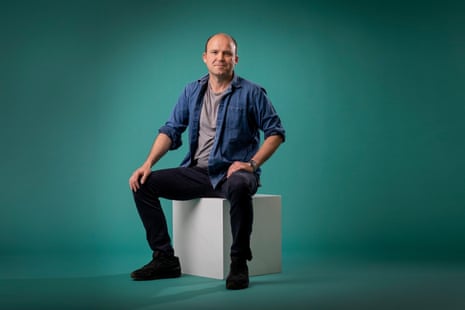You can never be sure who you are going to meet when you interview an actor. Will it be the leery landowner with prosthetic teeth and nice little holiday mansion, the lank-haired, hand-wringing vicar, or perhaps the phantasmagorical green man who lets it all hang out? Rory Kinnear is all of these – and more besides – in his latest film, Men, a creepy symbolist horror mashup written and directed by Alex Garland. But the man who has just walked across London to be photographed and interviewed – no minders in tow – looks about as threatening as a fine spring day, and is so refreshingly personable that by the end of the photoshoot he has winkled a confidence out of the photographer that even her family don’t yet know.
Kinnear plays no fewer than eight men in the film, a sleight of hand, body and face that culminates in a pub scene with five of them drinking together at the bar. How is that even possible? “It was quite lo-fi actually,” he says. “It was basically a question of camera angles and having to stand in certain places, with five stand-ins for the characters that I was playing, all of whom were dressed similarly and aged similarly. We’d do the scene five ways and I’d only be playing one of the characters. But it also places a lot of limitations on you: like you can’t stray over there, because that will cost us another 20 grand in post-production.”
It’s all in a day’s work for one of the UK’s most versatile actors. “Weirdly,” he says, “I’ve now done multiple multiple versions of myself in a scene; it was my fourth time doing it, which is an odd niche to have found oneself in, but it means I sort of know the score now. It’s quite laborious, but also fun.”
As “the Creature”, in one episode of the cult horror series Penny Dreadful, he played three versions of himself in a padded cell – “just me and Eva Green and no yellow contact lenses, which was nice, because it meant I could actually see her”. In Steve Pemberton and Reece Shearsmith’s black comedy Inside No 9, he was a Shakespearean pair of long-lost twin brothers. Immediately after Men, he hopped over to the US for a comedy series, Our Flag Means Death, in which he again played twins. Among other things, it meant being stalked by his own 3D printed skull, through a succession of makeup trucks. For Men, there were several such trucks, draped with wigs and prosthetics. “Then I walked into a makeup truck on the set for Our Flag Means Death and there was my skull, sent to haunt me again.”

Kinnear’s co-star in the film is Jessie Buckley, who plays Harper, a woman haunted by the fallout from an abusive marriage, who seeks sanctuary in an idyllic Cotswolds hideaway, only to find it besieged by personifications of her worst nightmares. Among them are a priest and a policeman, the very people to whom women in danger are most likely to run. But although both institutions have seldom been far from the headlines in recent years as agencies of an out-of-control patriarchy, Kinnear is loth to pin the film down to any one political message. “It’d be a little bit too simplistic to say: ‘Gosh, aren’t men bad?’ I don’t think that’s what it’s doing,” he insists. “It’s a portrait of men through the eyes of a woman who’s just suffered a traumatic event because of what we see to be an abusive relationship. So it starts in that grief, and post-trauma, and I think it’s reflecting on what trauma does to the way that one person sees the world. It’s the story of Harper’s experience.”
So what sort of man is Kinnear? He became part of the pandemic narrative with a couple of initially loving, then angry, articles about the death from Covid of his disabled sister, Karina, whose funeral was on the day of one of the Downing Street parties. He had felt consoled, he wrote, by the sense of solidarity. “Pain like ours was tearing through families the world over. So, in some ways, it felt like we were all in it together. Well, not all of us, it turns out. Not them.”
Inevitably, he says now, he was shaped by a childhood in which he not only had an older sister with severe learning difficulties, but also lost his father – the actor Roy Kinnear – in a freak film-set accident when he was 10 years old. “I had a very strong-willed and loving mother and two loving sisters, and when I grew up, quite often there’d be a nurse or a carer in the house. I went to an all-boys school, but I was from an all-women house, so, even at 13 or 14, I guess I wasn’t necessarily aligning myself with traditional masculine roles. I wasn’t massively into sport. I did drama and I liked books, but that felt just as much male as female behaviour at that time; it didn’t bother me.”

Acting was a family business: his mother, Carmel Cryan, was in EastEnders for a while; his godfather was Michael Williams, the husband of Judi Dench (who took on the role after her husband’s death and still sends him birthday presents), so becoming an actor wasn’t such a distant dream. But the turmoil of bereavement had put an old head on young shoulders and he didn’t go to drama school until after graduating with a degree in English from Oxford.
“I felt like I wouldn’t get anywhere until I was about 40, because I felt about 40 when I was 14, and so I just presumed that I’d have to wait for my body to catch up with my sense of who I was,” he says. “Everything that happened before that was a pleasant surprise. I never really expected myself to be playing Hamlet and stuff like that.” But play him he did, winning one of a string of theatre awards that includes an Olivier for an exquisite restoration dandy, Sir Fopling Flutter, in The Man of Mode and a double whammy in the 2014 Critics’ Circle awards as an actor (Iago in Othello) and the author of the year’s most promising debut play, a close-to-home piece about a family with a disabled child.
Kinnear is 44, the father of two young children. His early heroics and foppish falderals have been shoved aside by sinister character parts such as the MI6 operative Bill Tanner in the James Bond films and the British fascist leader Colin Jordan in the recent TV miniseries Ridley Road. But he loves a laugh and goes misty-eyed when he talks about showing his small son the 1971 film Willy Wonka & the Chocolate Factory for the first time, with his dad playing the father of Veruca Salt. “There’s dad doing a bit of a pratfall as he goes down the egg chute, my son just laughing and making me replay and replay it,” he says. “What a wonderful legacy that is. Fifty years after he’s done this pratfall, the grandson he never met is laughing away.”
His own sense of humour is “quite dark”, he says. He has a much-repeated party gag about wanting to be a butcher when he was small because the local butcher’s missing finger proved his love of the job. He laughs like a naughty child when I tell him the critic sitting next to me at a screening of Men greeted the appearance of a decaying stag by loudly asking: “And is that Rory Kinnear, too?”
It’s a humour he shares with Buckley, as they discovered when they were holed up together for rehearsals in the Cotswolds home of Garland’s dad, and later after each day’s filming in a Cheltenham hotel, with the world locked down around them. “It was definitely one of the most intense experiences in terms of a working relationship,” he says, “But luckily Jessie is one of the world’s best laughers.”
He looks back on the two pandemic years as the best and worst of times. It enabled him to spend a lot of time with his partner, the actor Pandora Colin, and their children, but none with his dying sister. Likewise, as someone whose life has been shaped by an unnecessary accident (his father fell from a horse in a scene the stuntmen had refused to do), he is heartened by moves in the film world to make it a safer place, through innovations such as intimacy coordinators, even as the abuse cases keep rolling in. “I think there’s quite a lot of questioning around,” he says.
And then he launches into a riff, delivered in such a deadpan voice, and with such a poker face, that it’s hard to work out how serious he is being. “Everything really, over the last four or five years, has been about niceness. Obviously, people have different takes on it, and obviously there’s quite a lot of un-niceness around at the moment. A lot of politics has become un-nice, but it feels like we’re hoping to move to a nicer world, and there’s been a momentum shift. The move towards niceness is probably – um – nice.” Enough horror; give the man a political comedy slot.

Comments (…)
Sign in or create your Guardian account to join the discussion